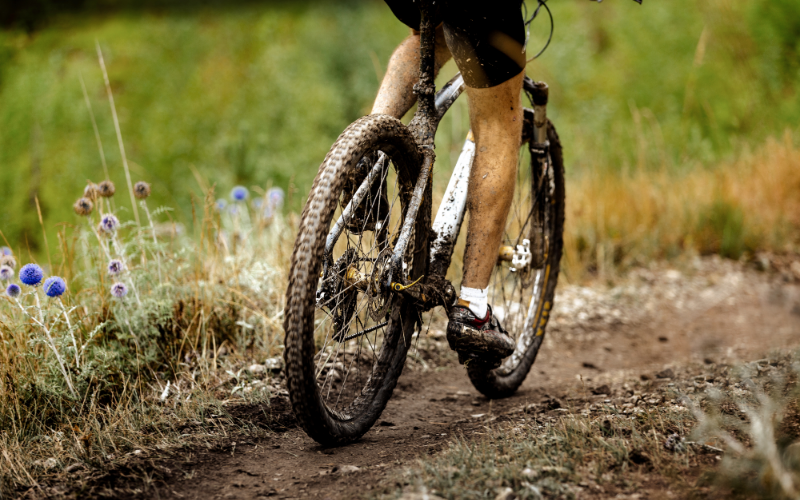Elite mountain bikes don’t come cheap. The five-digit price range often turns away many interested in taking up this particular hobby. But, while bikes costing just as much as an entry-level car will give you plenty of reasons to smile while on the trail, mountain bikes coming at the fraction of the said cost aren’t half-bad either.
Thanks to what’s known as the “trickle-down effect”, where certain features from top-end bikes make it to their more affordable siblings, the best full suspension mountain bikes under 2000 dollars don’t really give up much in terms of ride comfort and component quality.
Because it’s a highly-competitive price range in the biking industry, brands have no choice but to edge each other out by trying to outvalue each other by offering high-quality builds for a far more affordable price point.
The best full suspension mountain bikes below the price tag of $2000 will have surprisingly high-spec components. Some might even have carbon fiber frames.
Read on below to know more about the top bikes you can get for under 2000 dollars.
| Image | Title | Price | Prime | Buy |
|---|---|---|---|---|
 | Diamondback Bicycles 2015 Sortie 1.0 Full Suspension Complete Mountain Bike, Red, 15.5-Inch/Small | PrimeEligible | Buy Now | |
 | Schwinn Traxion Mountain Bike, Full Dual Suspension, 29-Inch Wheels , Blue/grey | PrimeEligible | Buy Now | |
 | Kent KZ2600 Dual-Suspension Mountain Bike, 26-Inch | PrimeEligible | Buy Now | |
 | Mongoose Impasse Mens Mountain Bike, 29-Inch Wheels, Aluminum Frame, Twist Shifters, 21-Speed Rear Deraileur, Front and Rear Disc Brakes, Silver | PrimeEligible | Buy Now |
1. Diamondback Catch 1
Diamondback is synonymous with excellent bikes. The only problem is, until recently, the brand was also known for its high asking price.
Luckily, that’s no longer true. These days, you’ll find a lot of Diamondback bikes at a more affordable price point.
Case in point, the Diamondback Catch 1.
One of the very few full-suspension bikes on the market that’s available for below $2,000, the Catch 1 is available in men’s and women’s models. Although both, outside the touchpoints, are relatively the same, so, if you’re comfortable with the touchpoints, the gender-specific models are very much interchangeable.
Equipped with 27.5-inch wheels and 3-inch-wide tires, the Catch 1 might ride a bit slow if you’re used to faster bikes, but it won’t leave you wanting for more when it comes to technical terrains.
The best part is that the Catch 1 has arguably the best suspension at its price point.
Equipped with a RockShox Yari RC 27-plus front fork and a RockShox Monarch rear shock, the bike has a whopping 130mm of travel. This, combined with its wide tires, means that you’ll be happy trailing with this bike.
You’ll be even happier knowing that you’ve got an SRAM NX 1×11 transmission with hydraulic brakes and a single ring guarantees that you’ll have no trouble rolling over rocks and logs alike.
Pros:
- Impressive downhill ride handling and performance
- Excellent price-to-performance value
- Plus-sized tires
- Surprisingly agile
Cons:
- Boring aesthetics
- Has difficulty climbing
2. Schwinn Traxion Mountain Bike
Schwinn gets a lot of undeserved hate for their value-oriented bikes.
Sure, their bikes aren’t the best quality, but they’re not expensive either. In fact, they cost significantly less compared to competition similar specs, regardless of the quality of the materials.
A good example is the Schwinn Traxion Mountain Bike.
Forget about $2,000, this full-suspension mountain bike costs a shade less than $1,000, making it the cheapest and most affordable mountain bike on our list.
Now, what kind of compromises does the bike make at its price point?
Not a lot, actually.
It has a dual-suspension lightweight aluminum frame with a premium suspension fork and is equipped with a 24-speed Shimano EZ-fire gear system, as well as aluminum front and rear disc brakes with 2.25-inch-wide tires.
All in all, this is a great starter bike for people who want a full-suspension set-up but don’t necessarily want to splurge on it just yet.
Pros:
- Sporty looks and aesthetics
- Double-walled alloy wheel rims
- Easy-maintenance crank
- DIY-friendly assembly
Cons:
- No mount for water bottle
- Heavy
3. Kent KZ2600
The price of the Kent KZ2600 isn’t some sort of a prank. It’s real.
Costing roughly about the same as a single component of a $2,000 bike, the Kent KZ2600 definitely isn’t going to help you trek down mountains, but, as far as value goes, it’s hard to argue against it.
Yes. The components aren’t the highest quality. You’ll probably find yourself replacing a component or two every now and then. You might even want to replace the tires as soon as you can.
Still, despite those compromises, the fact remains that it’s inexpensive.
At this price point, the value offered by the KZ2600 is tremendous.
It’ll take you through muddle puddles, slightly rough terrain, and even some snow and ice just fine.
If all you need is a bike to take you places and handle the occasional rough terrain, the KZ2600 is a good choice.
Pros:
- Inexpensive
- Suspension works on all but the toughest of terrains
- Stylish
- Resistant to rust and corrosion
Cons:
- Stopping power leaves a lot to be desired
4. Mongoose Impasse
Similar to other more affordable full-suspension mountain bikes, the Mongoose Impasse is not for hardcore trail riders.
The Impasse is best for those who plan on taking trail rides seriously but don’t have the budget for it just yet. Because, for its price point, it’s an excellent full-suspension mountain bike that comes with surprisingly high-quality components.
This includes an element suspension fork and aluminum suspension frame that gives you control, comfort, and performance, even when facing the roughest of bumps and terrain.
The alloy wheels come with a quick-release front for easier changing, and the front and rear disc brakes give it some adequate stopping power. But, perhaps the best part is that the 21-speed Shimano rear derailleur comes with SRAM twist shifters that let you change gears smoothly on the fly.
The Impasse might not be something that you can make jumps or do highly technical terrains with, but it can handle more than its fair share of abuse just fine.
Pros:
- Excellent value for the money
- Large 29-inch wheels
- Plenty of stopping power
Cons:
- Added weight can make uphill climbs difficult
Why Are Full Suspension Mountain Bikes Better?
At the $2,000 price range, your most pressing concern is whether you’ll invest in a rear suspension or not.
Having a rear suspension is what differentiates a full suspension bike from a hardtail.
Of course, having a rear suspension means better ride quality and comfort. The only problem is that it means more weight and complexity. There is also the possibility of getting lower-quality components for the price in return.
Meanwhile, getting a hardtail for the same price point might mean a rougher overall ride, but it also means that you could buy higher-quality and more reliable components.
So, ask yourself, is the full suspension mountain bike worth it?
Well, that depends on where you’re riding.
Full suspension mountain bikes are best for trails that are rough and go on for longer. If, for example, the trails you ride don’t really take more than a couple of minutes to finish, then you might benefit more from a more fun and agile lightweight hardtail ride. But, for rugged terrains, you and your body will be thanking you for investing in a full-suspension mountain bike.
And while the quality of the components will be noticeably better on a hardtail for the same price point, the difference isn’t all that much.
In the end, it still all depends on how and where you plan on riding your mountain bike.
TLDR; the rougher the trails, the more you’ll need a full-suspension bike.
Is It Easy to Maintain a Full-Suspension Bike?

In exchange for much better ride quality and comfort, full suspension mountain bikes give you a bit more to worry about.
The rear linkage that makes full suspension bikes more comfortable to ride on means having more pivots, bearings, and bushings to clean, re-grease, and take care of after every ride. Otherwise, they’ll end up seizing or getting rust.
This isn’t something that most people think of when buying a full-suspension bike.
After a long and hard day from the trails, the last thing you want to do is to spend more time cleaning your bike than letting your body rest.
Hardtails are easier to maintain and clean without really giving up so much on smoother trails, which is why some folks have hardtails as a wet-weather or winter set-up.
However, not everyone can afford to have two bikes that cost somewhere around $2,000, and for all-around toughness, especially on difficult trails, full-suspension mountain bikes are hard to beat.
Are Full Suspension Mountain Bikes Worth It?
A great way to save money and get more value-per-dollar is to buy a used full suspension mountain bike.
Just keep in mind that, as mentioned earlier, full-suspension mountain bikes are more maintenance-extensive.
Now, why is this important? It’s because used and unmaintained full suspension mountain bikes might end up costing you more in the long run than buying an all-new set-up.
Not to mention, since most lifetime manufacturer warranties in bikes are not transferable between owners, you won’t be able to take advantage of the added price premium of some components.
If you’re buying a used full-suspension mountain bike, check how many miles the chain has on it. Also, don’t forget to inspect the chainring teeth for signs of extensive wear and tear. Cracks and dents on the bike frame are also red flags.
If any of these three (or all three) are present, it’s best to move on.
Of course, the best way to ensure the quality of a used mountain bike is to have a trusted bike shop check it out.
A preliminary check won’t usually take bike technicians more than a couple of minutes. However, a single check could potentially save you from hundreds if not thousands of dollars in unexpected maintenance costs down the line. This means that it’s a worthy investment. This is especially since most bike shops don’t really charge much for it anyway.
All in all, buying a used full-suspension mountain bike is a great way to get a $5,000 mountain bike for around $2,000, so long as you exercise caution and you’re aware of the risks.
Conclusion
All-mountain full-suspension rigs don’t come cheap, but they’re able to more than prove their worth once you take them to the harder trails.
Yes, they’re less agile and maneuverable. Hardtails are best if you want something zippier, or so to speak. But, full-suspension rigs are more comfortable to ride on. They’re also easier on the body.
They’re better suited for rough terrain and will let you go to more places than a hardtail ever could.
Unless you’re willing to invest in two bikes for smoother trails and tough terrain, we recommend getting a full-suspension mountain bike.
Luckily, as our recommendations have proven, you don’t need to spend more than $2,000 to get your money’s worth.
Related Posts:
The 6 Best Gravel Bikes Under $1,000
The 6 Best Electric Bikes Under $2000
The Best Mountain Bikes Under $300 [Reviews And Buying Guide]






















 The 6 Best Electric Bikes Under $2000
The 6 Best Electric Bikes Under $2000